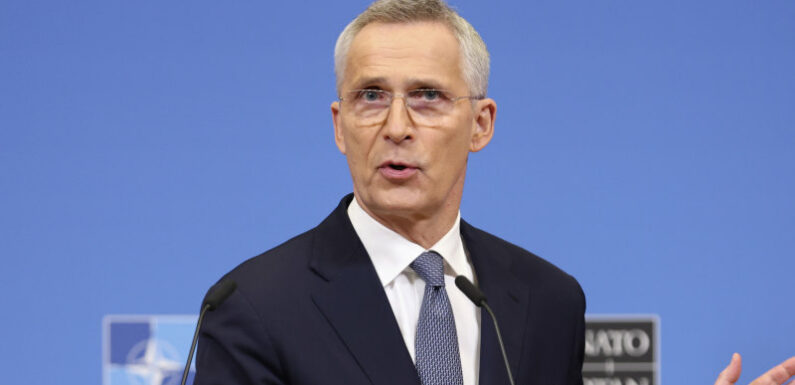
Brussels: Jens Stoltenberg says NATO needs to be prepared to deal with a potential Taiwan crisis, saying any use of force by China would have profound consequences for global and European security, economy and trade.
In an exclusive interview with The Sydney Morning Herald and The Age the former Norwegian prime minister said the organisation he has helmed since 2014 has “come a long way” in planning a response to a potential Chinese threat. He admitted the military alliance that French President Emmanuel Macron once declared as “brain-dead” was previously focused on fighting terrorism in Afghanistan, but the war in Ukraine had revitalised it.
Secretary General Jens Stoltenberg says NATO has “come a long way” in planning a response to a potential Chinese threat.Credit:AP
Stoltenberg said that while NATO was, and would remain, a regional alliance, combining North America and Europe, the security challenges posed by China meant it needed to deepen its engagement with its like-minded partners in the Indo-Pacific, including Australia.
“We cannot act as if security was regional. Security is global, the threats we face in this region are global threats,” he said of the organisation founded in the aftermath of World War II.
On Tuesday, NATO will hold a flag-raising ceremony outside its headquarters on the outskirts of Brussels, formally admitting Finland to the alliance, which pledges to defend any member who is attacked. Sweden is expected to join later this year and Ukraine also wants admission, but Stoltenberg said the priority was making sure Ukraine prevailed as a sovereign state against the Russian invasion, now into its second year.
Senior NATO officials will attend the Australian Strategic and Policy Institute’s Sydney dialogue on Tuesday and Wednesday, which focuses on how the civilian and military tech sectors can help counter hybrid warfare, such as cyberattacks on critical infrastructure.
Separately, Australian officials will attend a meeting of foreign ministers at NATO headquarters this week for a session on Indo-Pacific security, and Prime Minister Anthony Albanese will be invited to attend the Vilnius summit in Lithuania in July along with the leaders of Korea, Japan and New Zealand.
One Western official said that far from distracting the alliance from the threat posed by China, Russian President Vladimir Putin’s invasion had served as an impetus for allies to accelerate their planning.
“For many years NATO didn’t address China because we focused on the Soviet Union and later on the fight against terrorism,” Stoltenberg said, adding the turning point came in 2019 with the debate in Europe over whether to follow Australia’s lead in banning Huawei from 5G networks, although the Chinese telecommunications vendor continues to hold significant market share in Europe.
Prime Minister Anthony Albanese, Japanese Prime Minister Fumio Kishida, NATO Secretary General Jens Stoltenberg, New Zealand Prime Minister Jacinda Ardern and South Korean President Yoon Suk-yeol at the NATO summit in Madrid last year.Credit:AP
“But also allies realised that what happens in Asia, China matters also for our security, so we have come a long way, and it’s great to see the unity and also the way we are able to work with our Asia Pacific partners and Australia being, of course, an important and extremely vital partner for NATO,” he said.
Putin has complained the United States is forming a global NATO through an “axis” involving Australia and other Indo-Pacific countries. Stoltenberg said the strengthened partnerships were a natural consequence of Russia’s own illegal behaviour in invading Ukraine.
“Beijing’s watching closely the war in Ukraine, the price President Putin is paying and the potential rewards he can achieve,” he said.
“This just shows that our security is linked.
“Authoritarian regimes are coming closer and closer as we see China and Russia are. That makes it even more important that countries believe in democracy, freedom, stand together – that’s exactly what we do.”
Asked what NATO’s response would be if China used military force to take over Taiwan, as Xi Jinping has threatened, Stoltenberg said while it would not trigger Article 5 – NATO’s collective defence mechanism – NATO allies would respond.
“Of course it will not call for Article 5, but it will impact and therefore we need to be prepared also to deal with a crisis in and around Taiwan,” he said.
“Allies, especially the United States are assessing the potential consequences and the potential ways to react.”
He said the priority was deterring and preventing any conflict from starting, but NATO would remain firm if this was not achieved.
“If something happens it is even more important that we stand together and support each other because this will have profound consequences for our economy for trade, of course also, for our security.”
Get a note directly from our foreign correspondents on what’s making headlines around the world. Sign up for the weekly What in the World newsletter here.
Most Viewed in World
From our partners
Source: Read Full Article

